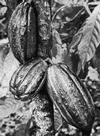- chocolate
-
—chocolaty, adj./chaw"keuh lit, chok"euh-, chawk"lit, chok"-/, n.1. a preparation of the seeds of cacao, roasted, husked, and ground, often sweetened and flavored, as with vanilla.2. a beverage made by dissolving such a preparation in milk or water, served hot or cold: a cup of hot chocolate.3. candy made from such a preparation.4. an individual piece of this candy.5. any syrup or flavoring made from this preparation or artificially imitating its flavor.6. a dark brown color.adj.7. made, flavored, or covered with chocolate: chocolate cake; chocolate ice cream.8. having the color of chocolate; dark-brown.[1595-1605; < Sp < Nahuatl chocolatl]
* * *
It is consumed as candy, used to make beverages, and added as a flavouring or coating for confections and baked products. It was introduced to Europe by Hernán Cortés following his visit in 1519 to the court of Montezuma II, who served the conquistador a bitter cacao-bean drink, xocoatl. In making chocolate, the kernels of fermented and roasted cacao beans are ground into a paste called chocolate liquor, which may be hardened in molds to form baking (bitter) chocolate, pressed to reduce the cocoa butter (vegetable fat) content and then pulverized to make cocoa powder, or mixed with sugar and additional cocoa butter to make sweet (eating) chocolate. The addition of concentrated milk to sweet chocolate produces milk chocolate. White chocolate, made from cocoa butter, sugar, milk, and vanilla, contains no cocoa solids. Rich in carbohydrates and fat and containing small amounts of caffeine, chocolate is an excellent source of quick energy. Brazilian cocoa podsCarl FrankPhoto Researchers
Brazilian cocoa podsCarl FrankPhoto Researchers* * *
▪ foodfood product made from cocoa beans, consumed as candy and used to make beverages and as a flavouring ingredient or coating for various confections and bakery products. Rich in carbohydrates, it is an excellent source of quick energy and also contains minute amounts of the stimulating alkaloids theobromine and caffeine.At the court of Montezuma, the Aztec ruler of Mexico, in 1519, Hernán Cortés (Cortés, Hernán, marqués del Valle de Oaxaca) was served xocoatl, a bitter cocoa-bean drink, which he introduced to Spain. Sweetened, flavoured with cinnamon and vanilla, and served hot, the beverage remained a Spanish secret for almost a hundred years before its introduction to France. In 1657 a Frenchman opened a shop in London, at which solid chocolate for making the beverage could be purchased at 10 to 15 shillings a pound. At this price only the wealthy could afford to drink it, and there appeared in London, Amsterdam, and other European capitals fashionable chocolate houses, some of which later developed into famous clubs. About 1700 the English improved chocolate by the addition of milk. The reduction of the cost of the beverage was hampered in Great Britain by the imposition of high import duties on the raw cocoa bean, and it was not until the mid-19th century, when the duty was lowered to a uniform rate of 1 penny a pound, that chocolate became popular.Chocolate manufacture started in the American colonies in 1765 at Dorchester, Mass., using beans brought in by New England sea captains from their voyages to the West Indies. James Baker financed the first mill, which was operated by an Irish immigrant, John Hanan. Waterpower was used for grinding the beans.Chocolate is made from the kernels of fermented and roasted cocoa beans. The kernels are ground to form a paste called chocolate liquor, which may be hardened in molds to form baking (bitter) chocolate; pressed to reduce the cocoa butter (vegetable fat) content and then pulverized to make cocoa powder; or mixed with sugar and additional cocoa butter to make sweet (eating) chocolate, developed by the English firm of Fry and Sons in 1847. Coating chocolate for use on candies and biscuits (cookies) came into use soon afterward. The addition of concentrated milk to sweet chocolate produces milk chocolate, introduced by Daniel Peter of Switzerland in 1876. See cacao.* * *
Universalium. 2010.
